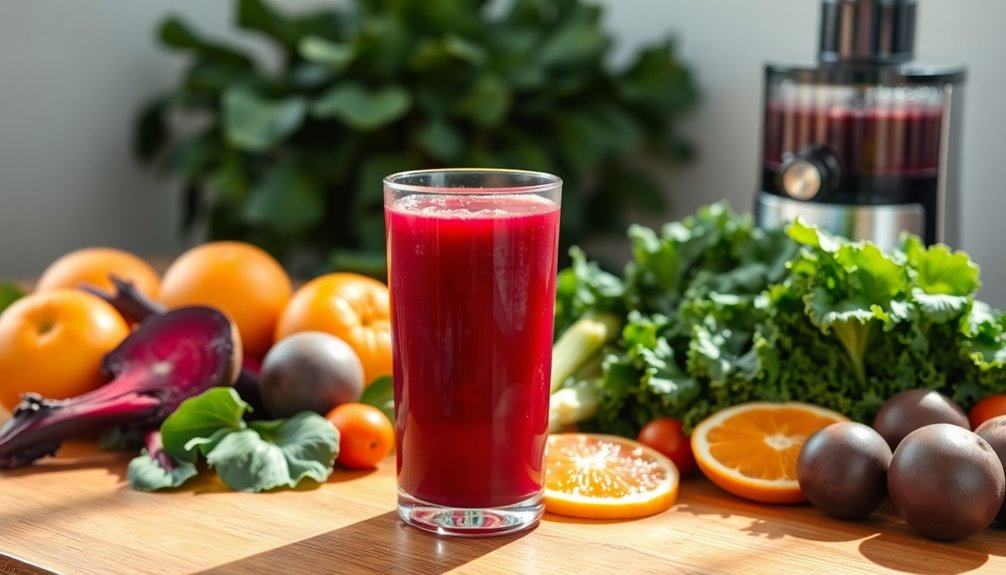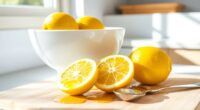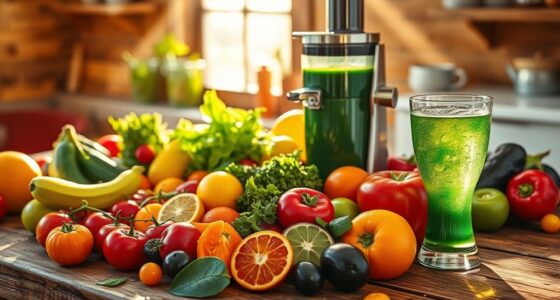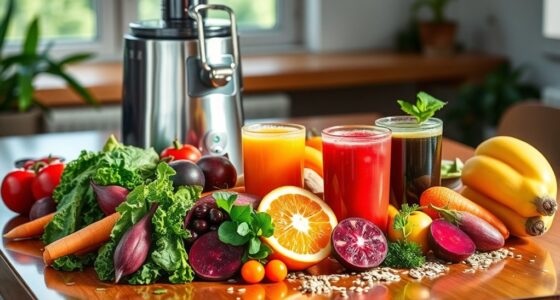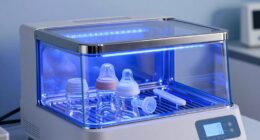To maximize juice benefits for your heart health, choose a variety of colorful fruits and veggies, emphasizing fresh, organic produce. Drink your juices immediately after preparation to capture all nutrients. Incorporate leafy greens and nutrient-rich roots like beets for added density. Experiment with flavor combinations and superfoods like chia seeds for extra heart-loving nutrients. Monitor portion sizes to guarantee balanced consumption. Keep going to discover more tips for a heart-friendly juice routine!
Key Takeaways
- Incorporate a variety of colorful fruits and vegetables to maximize phytonutrients and antioxidants for heart health benefits.
- Choose fresh, organic, and locally sourced produce to enhance flavor and nutrient density while supporting sustainable farming.
- Consume freshly made juice within 15-30 minutes of preparation to preserve essential nutrients and antioxidants.
- Monitor juice portions, aiming for 4-8 ounces daily, and consider diluting with water to manage sugar intake.
- Rotate juice recipes with seasonal ingredients and superfoods like chia seeds and turmeric for diverse nutrients and enhanced heart health.
Choose a Variety of Colorful Fruits and Vegetables

Eating a rainbow of fruits and vegetables is key to boosting your heart health. Each color packs unique phytonutrients that contribute to your overall cardiovascular health.
For instance, red foods like tomatoes are rich in lycopene, which can lower LDL cholesterol and reduce inflammation. Dark leafy greens such as spinach and kale provide vitamins K and A, supporting healthy blood vessels and lowering blood pressure.
Incorporating orange and yellow veggies, like carrots and sweet potatoes, adds beta-carotene, linked to improved heart health. Additionally, juices like beet juice can enhance blood flow and lower blood pressure, further supporting cardiovascular wellness.
Don't forget about berries! Blue and purple varieties like blueberries and blackberries are loaded with anthocyanins, helping reduce oxidative stress and promote better cardiovascular function.
Embrace diversity in your diet for a healthier heart!
Prioritize Fresh, Organic Produce

When you prioritize fresh, organic produce, you're not just avoiding harmful chemicals; you're also boosting your heart health. Choosing local and seasonal options means you'll enjoy fresher flavors and more nutrients in your juices. This simple shift can make a big difference in how often you incorporate heart-healthy juices into your routine. Additionally, consuming unprocessed foods can enhance the nutrient density of your juices and support overall cardiovascular health.
Choose Local Sources
Choosing local sources for your juice ingredients not only enhances the flavor but also boosts the nutritional value of your drinks. By opting for fresh, organic fruits and vegetables grown nearby, you're supporting heart health with higher nutrient content. Local produce is often harvested at peak ripeness, maximizing its antioxidant levels, which are essential for cardiovascular wellness. Additionally, supporting local farms fosters sustainable practices, reduces your exposure to harmful chemicals, and strengthens your community's economy. Regularly consuming energy-efficient models can also contribute to a healthier environment by reducing energy consumption.
| Benefit | Local Sources |
|---|---|
| Nutrient Content | Higher in local produce |
| Environmental Impact | Supports sustainable farming |
| Flavor | Fresher and tastier |
| Community Support | Strengthens local economy |
Seasonal Produce Advantage
Fresh, organic produce harvested in season offers significant advantages for your juice creations. By prioritizing seasonal produce, you not only enhance flavor but also boost your heart health by maximizing nutrient content and antioxidant intake.
Here are three key benefits:
- Peak Freshness: Seasonal fruits and vegetables are at their nutritional best, ensuring you get the most out of your juices.
- Reduced Chemicals: Organic produce typically avoids harmful pesticides and fertilizers, promoting better heart health.
- Sustainable Choices: Choosing local seasonal options lowers the carbon footprint and supports community well-being.
Incorporating a variety of these seasonal and organic ingredients into your juices makes them tastier and encourages regular consumption, ultimately benefiting your heart health. Additionally, many seasonal fruits and vegetables, like raw summer squash, are low in calories and high in water content, further supporting your heart health and hydration.
Consume Juices Immediately After Preparation

To get the most out of your juice, drink it right after you make it. This way, you preserve the essential nutrients and enjoy the fresh flavor that can fade quickly. Fresh juices not only taste better but also pack a greater health punch, especially for your heart. Additionally, consuming juices immediately helps maximize vitamin C intake from the fruits, further enhancing their health benefits.
Nutrient Preservation Importance
Since juices start losing their nutrient content almost immediately after preparation, consuming them right away is vital for maximizing their health benefits.
To guarantee ideal nutrient preservation, keep these tips in mind:
- Drink within 15-30 minutes: This timeframe helps retain vitamin C and antioxidants, essential for heart health.
- Avoid exposure to air and light: These elements greatly degrade sensitive vitamins, particularly B vitamins and vitamin C.
- Enjoy freshly made juices: Research shows they can have up to 50% more antioxidants compared to stored options. Additionally, using fresh organic produce ensures that your juices are free from pesticides and retain maximum nutrients.
Freshness Enhances Flavor
Freshly prepared juices contain a higher concentration of vitamins, minerals, and antioxidants, ensuring you get maximum support for your heart health. When you drink your juice immediately, you prevent oxidation, which can degrade essential nutrients and diminish their effectiveness.
The vibrant and enjoyable taste of fresh juices encourages you to stick to a heart-healthy diet. Plus, consuming them right away helps retain natural enzymes that aid in digestion and nutrient absorption, enhancing the heart-healthy properties of each sip. Additionally, juices like celery juice are known for their anti-inflammatory properties, further benefiting heart health.
Incorporate Leafy Greens for Nutrient Density

Incorporating leafy greens into your juice not only boosts nutrient density but also enhances your overall heart health.
These nutrient-packed powerhouses, like spinach and kale, deliver essential vitamins and minerals that support cardiovascular function.
Here are three key benefits of adding leafy greens to your diet:
- Rich in Dietary Fiber: This helps lower cholesterol levels and promotes a healthy digestive system.
- Packed with Antioxidants: Leafy greens contain flavonoids and carotenoids that reduce inflammation and oxidative stress.
- Low in Calories: They allow you to maximize nutrients while keeping calorie counts in check, supporting a balanced diet for heart health.
Additionally, leafy greens provide essential minerals that play a vital role in maintaining overall cardiovascular health.
Add Nutrient-Rich Roots Like Beets

Adding nutrient-rich roots like beets to your juice can greatly enhance its heart health benefits. Beets are packed with dietary nitrates that help lower blood pressure and improve blood flow, making them a fantastic addition to your routine.
The antioxidants in beets, particularly betalains, have powerful anti-inflammatory properties that can reduce oxidative stress and support cardiovascular function. Regularly consuming beet juice may also lower LDL cholesterol levels, promoting better cholesterol management.
Plus, beets add a naturally sweet flavor along with essential vitamins and minerals like folate and potassium, which are crucial for heart health. Incorporating beets into your juice can also provide antioxidant power, which is beneficial for overall cardiovascular health. Whether you're looking to boost your juice or enhance your exercise performance, incorporating beets is a smart choice for your heart.
Hydrate With Water or Coconut Water

While you might focus on nutrient-rich juices for heart health, don't underestimate the importance of staying hydrated with water or coconut water. Proper hydration is essential for maintaining blood volume and circulation, which supports oxygen delivery to your tissues.
Coconut water is especially beneficial, as it's a natural source of electrolytes like potassium and magnesium that help regulate blood pressure.
Here are three hydration tips to enhance your heart health:
- Aim for 8-10 cups of fluids daily, prioritizing water and coconut water.
- Use coconut water post-workout for a revitalizing electrolyte boost.
- Monitor your hydration levels; dehydration can increase heart rate and blood pressure.
Limit Added Sugars in Your Juices

When you make juices, it's important to focus on whole ingredients to keep added sugars in check.
Instead of reaching for sweeteners, try using naturally sweet fruits that provide flavor without the extra calories.
This way, you can enjoy delicious juices while supporting your heart health. Additionally, incorporating low carb foods can help maintain healthy blood sugar levels, further benefiting your heart.
Choose Whole Ingredients
Choosing whole ingredients for your juices is essential for maximizing health benefits, especially for your heart. By limiting added sugars, you can greatly improve your cardiovascular health and keep cholesterol levels in check. Whole fruits retain fiber, vitamins, and minerals, which processed options often lack.
Here are three tips to help you choose wisely:
- Select 100% juice: Always read labels to avoid added sugars.
- Incorporate whole fruits: Use apples, berries, or other fruits for natural sweetness and fiber.
- Monitor your servings: Keep your juice portions reasonable to prevent excess calorie intake.
These small changes can help you enjoy delicious juices while supporting your heart health effectively!
Opt for Natural Sweeteners
To boost the health benefits of your juices, opting for natural sweeteners is a game changer. By reducing added sugars, you lower your risk of obesity and heart disease, which are linked to high triglycerides and LDL cholesterol levels.
Sweetening your juices with fresh fruits like bananas or apples not only enhances flavor but also contributes essential vitamins and fiber, supporting healthy cholesterol levels. You can also incorporate herbs and spices like cinnamon or ginger for added sweetness without the sugar.
These options provide flavor while offering anti-inflammatory properties that further promote heart health. The American Heart Association recommends limiting added sugars to less than 10% of your daily calories, easily achievable with these natural alternatives.
Rotate Juice Recipes for Diverse Nutrient Intake

Rotating your juice recipes not only keeps your taste buds excited but also guarantees you get a broad spectrum of essential vitamins and minerals vital for heart health.
By incorporating a variety of fruits and vegetables, you enhance your nutrient intake while supporting your cardiovascular health. Here are three tips for diversifying your juice recipes:
- Seasonal Selection: Use seasonal fruits and vegetables like beets, spinach, and berries to maximize flavor and nutrition.
- Targeted Benefits: Focus on specific health benefits; for instance, beet juice improves blood flow, while berry juices offer heart-supporting anthocyanins.
- Colorful Combinations: Mix different colors of produce to boost antioxidant levels and reduce inflammation.
Regularly changing your juice recipes keeps your diet interesting and nourishes your heart!
Experiment With Different Flavor Combinations

While exploring new juice recipes, you can open up a world of flavors that not only tantalize your taste buds but also boost your heart health.
Combine fruits like apples and blueberries with leafy greens such as spinach or kale to enhance antioxidants, promoting better blood flow.
Don't shy away from herbs and spices like ginger or turmeric; they add zest while providing anti-inflammatory benefits.
Mixing citrus fruits like oranges with beet juice helps in cholesterol management, thanks to beets' polyphenols and the vitamin C from citrus.
You can also elevate your juice by incorporating pomegranate juice, which may reduce arterial plaque.
Finally, using unsweetened plant-based milks adds a creamy texture and heart-healthy proteins, supporting overall cardiovascular wellness.
Consider Adding Superfoods for Extra Benefits

Boosting the benefits of your juice can be as simple as adding a few superfoods. Incorporating these nutrient-packed ingredients can elevate your heart health markedly: Boosting the benefits of your juice can be as simple as adding a few superfoods. Incorporating these nutrient-packed ingredients can elevate your heart health markedly: adding ingredients like spinach, chia seeds, or blueberries can significantly enhance the nutritional profile. These ingredients not only infuse your juice with essential vitamins and minerals but also contribute to antioxidantrich juice benefits, which can help combat oxidative stress and promote overall cardiovascular well-being. Embrace these additions for a delicious and health-boosting beverage that supports your heart.
- Chia Seeds: These tiny seeds are rich in omega-3 fatty acids, helping reduce inflammation and lower cholesterol levels.
- Spinach: Packed with potassium and nitrates, spinach can help regulate blood pressure and improve blood flow.
- Berries: Strawberries, blueberries, and blackberries contain antioxidants like anthocyanins that are linked to reduced blood pressure and enhanced heart health.
For an even bigger boost, consider adding a pinch of turmeric. This golden spice, known for its anti-inflammatory properties, can further support your heart when mixed with these superfoods.
Start blending and enjoy the extra benefits!
Utilize Herbs and Spices for Flavor Enhancement

Enhancing the flavor of your juices with herbs and spices not only makes them more enjoyable but also supports your heart health. By adding herbs like basil and oregano, you can elevate your juice's taste without increasing sodium, which can help reduce blood pressure.
Spices such as turmeric contain curcumin, known for improving endothelial function and lowering cardiovascular disease risk. In addition, incorporating ginger can aid circulation and lower cholesterol levels, contributing positively to cardiovascular health.
Don't forget about rosemary and thyme; they're rich in antioxidants that combat oxidative stress and inflammation. Utilizing these flavorful ingredients not only boosts your juice's taste but also provides essential vitamins and minerals that support overall heart function.
Monitor Portion Sizes for Balanced Consumption

Monitoring portion sizes is essential for enjoying the health benefits of juice without overdoing it. Excessive juice intake can spike sugar consumption, leading to obesity and heart disease. Aim for 4-8 ounces of juice daily for balanced consumption.
Here are some tips to help you:
- Dilute Your Juice: Mix juice with water or smoothies to lower sugar concentration while keeping the flavors.
- Use Smaller Glasses: Serving juice in smaller glasses helps control portion sizes, preventing overindulgence.
- Choose Wisely: Opt for juices without added sugars or preservatives to enhance health benefits while supporting heart health.
Frequently Asked Questions
What Is the Best Juice to Drink for Your Heart?
To boost your heart health, consider incorporating pomegranate, beet, blueberry, or tomato juice into your diet.
Pomegranate juice is packed with antioxidants that may lower blood pressure, while beet juice helps enhance cardiovascular function.
Blueberry juice offers anti-inflammatory benefits, and tomato juice can improve cholesterol levels.
Don't overlook unsweetened plant-based milks like soy and oat; they're great for reducing LDL cholesterol.
Choose these options for a heart-friendly beverage routine!
What Is the Most Powerful Fruit for the Heart?
When you think about the most powerful fruit for your heart, blueberries often come to mind. They're packed with anthocyanins, which help reduce inflammation and lower LDL cholesterol levels.
Pomegranates are another strong contender, as their antioxidants may prevent arterial plaque buildup.
Don't overlook apples either; eating them with the skin can lower cholesterol.
Each of these fruits offers unique benefits that support your heart health, so include them in your diet!
What Is the One Drink Cardiologists Want You to Sip for a Healthy Heart?
If there's one drink cardiologists practically beg you to sip for a healthy heart, it's pomegranate juice!
Packed with antioxidants, this ruby-red elixir fights arterial plaque like a superhero. You'll lower your blood pressure and boost your heart health while enjoying its delicious taste.
Just remember, moderation is key! If you've got pre-existing conditions or take medications, chat with your healthcare provider before diving into this heart-boosting beverage.
Your heart will thank you!
What Is the Fastest Way to Improve Heart Health?
The fastest way to improve your heart health is to quit smoking.
You'll notice immediate cardiovascular benefits, and over time, your risk of heart disease drops considerably.
Combine this with regular exercise—aim for at least 150 minutes of moderate aerobic activity each week—and eat a balanced diet rich in whole grains, fruits, and vegetables.
Managing stress through mindfulness techniques also helps keep your heart in top shape, enhancing overall well-being.
Conclusion
Incorporating these juice tips into your routine can truly enhance your heart health. Remember, "you are what you eat," so choose vibrant, nutrient-dense ingredients to fuel your body. By experimenting with flavors and adding superfoods, you'll not only enjoy delicious drinks but also pack your juice full of heart-loving benefits. So grab those fruits and veggies, blend away, and toast to a healthier heart today! Your body will thank you for it!
Susannah expertise lies in researching and compiling evidence-based content on juicing, nutrition, and overall health. She is committed to ensuring that The Juicery World offers accurate, up-to-date, and trustworthy information to empower readers to take control of their health. Susannah’s goal is to inspire individuals to embrace juicing as a way to nourish their bodies and live their best lives.

